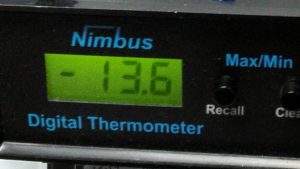NWS needs Cooperative Weather Observers
May 12th, 2022 by Ric Hanson
(Johnston, Iowa) – The National Weather Service Cooperative Observer Program (COOP) was formed in the late 1800s and has continued across much of Iowa to this day. Officials with the Weather Service in Central Iowa said the volunteer program is currently struggling however, with numerous vacancies leading to gaps in the climate record in many locations.

KJAN photo from Jan. 6, 2014.
The official records, officials says, are invaluable to learning more about floods, droughts, heat and cold waves, agricultural planning and assessment, engineering, and litigation. Observations can also play a critical part in deciding whether local communities receive state and federal disaster declarations and benefits. If observations are not available for your location, officials may determine these declarations, with hundreds of thousands if not millions of dollars on the line, based on surrounding observations, which may or may not be representative of your community.

CoOp Observer taking rain gauge measurement. (NWS)
The NWS in Johnston is asking for persons to help with record keeping, especially persons who are able to record data at the same time every day. Co-op observers are volunteers who use equipment (digital thermometers, an official rain gauge and other tools) provided by the National Weather Service, and routinely record daily high and low temperatures, as well as precipitation and snowfall amounts, at a particular time, often 7am (a 24-hour cycle). You will receive instructions on how and where to measure snow. The observations should only take you a few minutes per day.
In southwest Iowa, a Co-Op observer is needed in Bedford, which began keeping the official records in 1898, and in Beaconsfield, where records have been kept since 1951. If you, or another weather enthusiast you know, would be interested in being a part of this long standing network or would like more information, please contact either Cory Martin or Allan Curtis by emailing the office at dmx.coop@noaa.gov or calling (515) 270-4501.
Here is the list of communities where Observers are needed the most (and the year the records were first recorded)
Albia (1894); Ankeny (1950); Beaconsfield (1951); Bedford (1898); Britt (1897); Clarion (1944); Conrad (1977); Gilman (1899); Harcourt (1963); Hubbard (1973); Jewell (1949); Lorimor (1950); Ottumwa (1894); Parkersburg (1951); Tripoli (1946); Winterset (1893).





